uPVC Sliding Sash Windows to suit contemporary and period properties in London and Surrey
Exceptional Design & Quality uPVC Sliding Sash Windows
The main advantage of uPVC windows is that they don’t require painting; they can also save you between 25-100% of the cost compared to quality engineered timber sash windows.
Our network of preferred manufacturers and installers can accommodate contemporary and period properties across London and Surrey.
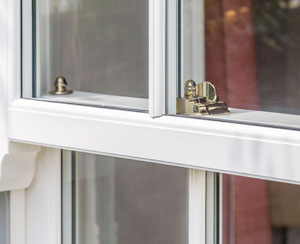
uPVC SLIDING SASH WINDOW DESIGN OPTIONS
DEEP BOTTOM RAIL
The bottom rail of timber sliding sash windows is two-four times deeper than any other part of the frame. uPVC sash windows, by comparison, do not need this extra depth, so all sides of the frame can be the same size. If you’re looking for a uPVC brand to replicate original timber features, however, the quality uPVC brands can recreate the extra depth for authenticity.
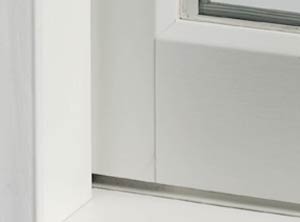
SLIM MEETING RAIL
A timber horizontal middle meeting rail is particularly slim at just 35mm. uPVC, by comparison, is nearly twice as thick at 60mm – this is because it needs to accommodate the double-glazed unit and retain strength. If you’re looking for a period look, the premium brands now offer an optional 45mm or 35mm slim meeting rail, which is achieved by bonding the glass directly onto the frame for extra strength.

GROOVED WELDS, POLISHED WELDS OR TRADITIONAL BUTT JOINTS
uPVC window frames are mostly visibly welded together at the joints. To create an authentic timber joint look, however, there are two options. Firstly, the weld can be polished – instead of being visibly shadow grooved – so that the weld simply disappears as it would with painted timber. Alternatively, the joints can be screwed together to form a traditional butt joint.
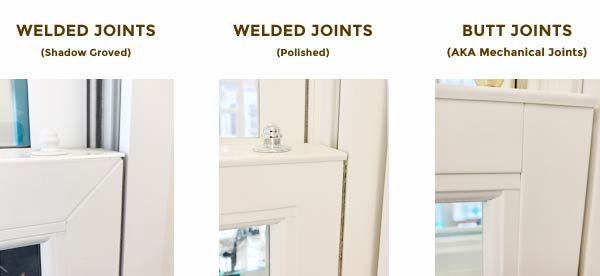
‘RUN-THROUGH’ OR ‘CLIP ON’ HORNS
Most timber sliding sash windows have external horns underneath the corners of the top-opening window. Historically, they served to stop the cords from over-extending – acting as a literal sash limit stop and adding strength to a weak point. Nowadays, timber sashes are restricted in a different way, but the sash horns remain a period design feature option for both uPVC and timber sash windows.
If you do decide to install them (and most people do), you can choose from either a cost-effective ‘clip on’ version or a more natural looking run-through horn. The latter forms a part of the sash as it would with timber, rather than just being stuck to the bottom of the frame. It’s worth noting that moulded ‘clip on’ horns weather and change colour at a different rate to the upgraded run-through horns.

FOILED OR SMOOTH FRAME SURFACE
A painted timber Redwood frame has a smooth appearance initially; then, over time, the frames age and dry out and the paint thins, so that you can often see the grain shape in the paint and the brush strokes. Hardwood has a prominent and visable grain underneath the paint. The uPVC frame surface is naturally smooth, however you can achieve a very subtle wood grain/brush effect (known as ‘foiled’) by applying a durable wood effect foil to the frames during the manufacturing process.
You can also accomplish a more pronounced real grain timber effect on coloured frames, to simulate the varnished look. These can look more like timber than timber! The final choice you make comes down to a matter of personal preference.

WHITE SUITED
Most sash windows, regardless of whether they’re timber or uPVC, are white. In the case of timber, the putty and beads are all painted white, and modern colours such as silver, black or grey simply don’t exist. uPVC frames may be white, however the rubber gaskets that serve to hold the double glazing are black.
Similarly, the aluminium or composite spacer bar that separates the two panes of glass is usually silver or black, with the Draught-proofing seals commonly grey. You can, however, opt to have your uPVC windows suited in white so that all the aforementioned items are white. If you’re looking for a period look and feel, this gives a sense of authenticity and may be an upgrade worth considering.
If you’re looking for a period look and feel, this gives a sense of authenticity and may be an upgrade worth considering.
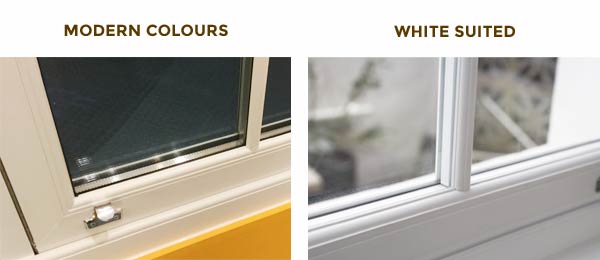
OPTIONAL DESIGN OPTIONS
EXTERNAL PULL HANDLES (ALSO KNOWN AS D HANDLES)
These are period features, often seen on timber sash windows and screwed into the underside of the meeting rail. They are available in white, gold or silver and are priced at around £20 per window.
.jpg)
SASH RESTRICTORS
Sash restrictors prevent the bottom sliding sash from opening more than a few inches. They allow for ventilation, prevent little ones from climbing out, and big ones from climbing in!
You can choose from two options: barrel restrictors or angel restrictors. Barrels require an Allen key to remove and replace the security barrel in order to fully open the window. Angel restrictors simply push in and allow the sash to open; then, when you shut the sash, the angel automatically re-locks in position. Most people opt for safety restrictors (at around £20 per window) with approximately 70% choosing the modern angel restrictor and 30% selecting the period barrel restrictor.
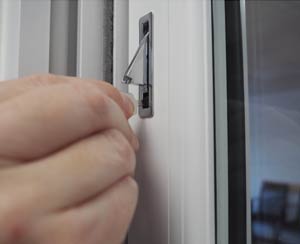
TILT FUNCTION
uPVC windows permit you to slide two tilt knobs which allow the sashes to tilt back into the room at 45 degrees for cleaning or ventilation. This feature comes as standard with uPVC, however the tilt knobs can easily be removed if preferred.
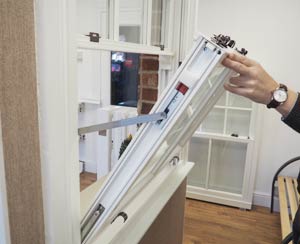
POLE EYES
Pole eyes are small metal circular hoops that are fixed to the top of the upper sashes of extra-large windows. These are particularly useful if you wish to use a long pole to slide down the upper sash.

ARCHITRAVE
All weight and cord timber sliding sash windows are fitted behind the internal brickwork* – not to the external bricks or stone openings like casement windows. This means that about 20mm of the frame is hidden behind the brickwork, and only a portion of the frame is seen from the outside. This gives the appearance of a slim visible frame profile and larger area of glass.
In period properties, uPVC windows should be fitted in the same way as their timber box sash predecessors. This means maintaining the existing architrave around the windows on the inside, so that the external slim frame appearance is preserved.** If needed, most period architraves can be replaced like for like. In the trade, we call the replacement and repainting of the architrave ‘fully finished’.
* In modern properties with plaster reveals, slim spring-operated (as opposed to cords and weights) windows can be fitted directly into the opening.
** Do you own a period property with internal architraves around the window reveals? Some uPVC window installers may offer you a shortcut where they leave the old architrave and sash boxes in place, while fitting the new windows onto the outside brickwork (rather than behind the inside brickwork). They’ll suggest this because it will save them time and you money.
In reality, however, the resulting appearance from the inside is less than ideal, while the glass area outside is left significantly reduced. In addition, the old rotten boxes risk letting the damp in and the heat out. The ideal fitting method comprises removing the old boxes completely, cleaning the brickwork, installing the new windows behind the inside brickwork, then sealing it all in with insulation.
Finally, a reputable installer will complete the job by hiding the sash frame and boxes with a new matching architrave.

YOUR FREE QUOTATION INCLUDES
A ‘no-salesperson’, no-obligation emailed quote
A free home visit, if required (for those in London and Surrey)
CAD drawings with detailed specifications for each quoted product
Realistic before & after photo simulations, if required
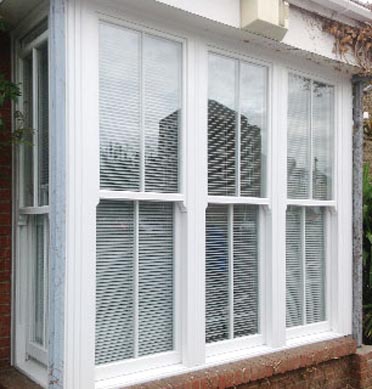

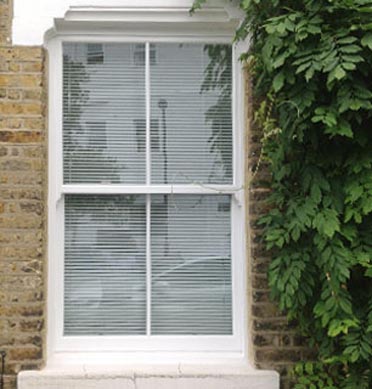

FOR LONDON AND SURREY
TIMBER WINDOW PRODUCTS
- SLIDING SASH WINDOWS
- CASEMENT WINDOWS
- BAY WINDOWS
- SPECIFICATIONS
TIMBER DOOR PRODUCTS
LOOKALIKES & ALTERNATIVES
- SITEMAPS:
- SITEMAP HTML
- SITEMAP XML
- URL LIST
- ROR
- Privacy Policy
© Copyright 2022 London Timber Windows and Doors Ltd All Rights Reserved. Company number 10273992

